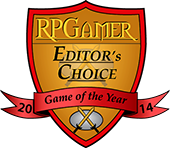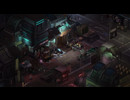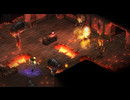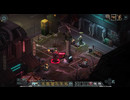
RPG of the Year

Second Place

Third Place

|
When tallying scores across a large group of people, coming out on top is no easy task. It isn't enough for every staff member who played our Game of the Year to like it — they need to absolutely love it, and this year Shadowrun: Dragonfall - Director's Cut earns our highest honor. We play RPGs for their story, setting, and combat, and Dragonfall excels at all three. Taking place in the already deep and fascinating RPG world of Shadowrun, Dragonfall puts the "role playing" in role-playing games with its smart, heady dialogue and frequent decisions. A wrong choice could lead a party member to be attacked by a beloved relative or one-time close friend. A grey choice could unshackle the deadliest AI in Berlin if it offers the right bribe. The dark setting is cyberpunk combined with mysticism, urban crime, fantasy creatures, and unfeeling corporate rulers, but the citizens of Berlin live in a post-apocalyptic nightmare where drugs and shadowrunning are part of a dangerous struggle for survival. The good guys want only to live. The bad guys usually do too. The game brings outstanding writing, an amazing world, and memorable characters into situations where player agency affects just enough to add to the experience and be thought-provoking.
Like any tactical game, though, the bulk of the playclock rolls in combat. Already designed for this purpose, the Shadowrun franchise brings a plethora of fun, diverse options for navigating the labs, warehouses, and corporations of Berlin. Hacking and intelligence sometimes turn the advantage in your favor, but when the going gets tough there's an array of gizmos, drones, spells, and weapons allowing the party to handle any combat situation. Stages are often intense with ambushes and countdown timers adding an urgency to the cover-based gunplay. The designers are wise enough to let off the gas sometimes, as infrequent levels are heavy on exploration instead of combat. Others start peaceful and slowly escalate into a debacle. The diverse scenarios and frequent changes of pace keep the individual stages energetic, surprising, and interesting in what can be a slow, repetitive genre.
Better than any individual aspect of the game is how well it works as a whole. It's cohesive and engaging. The background lore and the practical combat mechanics work together to augment both. Complex character histories align with Shadowrun's classes and its setting. Dragonfall is an unending thrill ride in a world we can't wait to see more of, and if Harebrained Schemes's continued crowd-funding successes are any indicator, we aren't the only ones. On the other hand...
It breaks my heart to inform everyone that Dragon Age: Inqusition is not RPGamer's Game of the Year. Seriously, what is wrong with us this year that Dragonfail would be the winner? Whether you are happy or sad about it, the point is, BioWare's in second place, and some of us don't like it (Kidding. Maybe.). In all fairness, Inquisition is the return to form that the franchise needs after Dragon Age II, and it's an impressive feat from start to finish with loveable characters, plotholes finally filled, and secrets around every corner. There are large, meaty areas to get swept up and lost in, and epic moustaches to curl. Inquisition is an overwhelming game that wants to give the player everything it has to offer, especially in its plot and gameplay. Inquisition is the complete package, and that's certainly something Vivienne won't greatly disapprove of. She does, however, greatly disapprove of being second place. Second place is a fancy word for loser.
The Banner Saga started 2014 out right. Following a successful Kickstarter, Stoic introduced us to a dying world of Norse myth and hardscrabble survival. The most iconic shots from the game show bands of refugees and warriors dwarfed by the rocky landscape, traveling into the unknown. Behind them trails a red banner, the record of their deeds. The glorious and the profane are recorded on this banner, as the decisions required to survive are never easy. The settlers of the Willamette Valley only had to deal with broken axles and dysentery — rough encounters to be sure, but nothing like deciding which allies to sacrifice to an implacable, stony army or being forced to choose between starvation and betrayal from one's own allies.
Mechanically, The Banner Saga contains multitudes. A tactical mass-combat system complicates the Oregon Trail-style travel and resource management. Most of the mechanical heft is concentrated in turn-based skirmishes. Selecting the proper skirmish party for each encounter is more difficult than many turn-based RPGs, as wounds carry over between battles. Over-committing a favorite bruiser can easily lead to more difficult battles down the road. The game is strong because all of its elements add to its themes of sacrifice and desperate heroism. Taylor Davis's violin and mournful vocals evoke Tolkien's Middle Earth, while the heavier portions of the soundtrack express what Vikings sing about when they sing about Ragnarok. The exceptional score is primarily songs of ending; even the soaring moments of triumph are tinged with vulnerable finality. The major characters are craggy and vibrantly colored, like nostalgic renditions of an animated classic of dark fantasy.



by Glenn Wilson, Sam Wachter, Zach Welhouse
|









